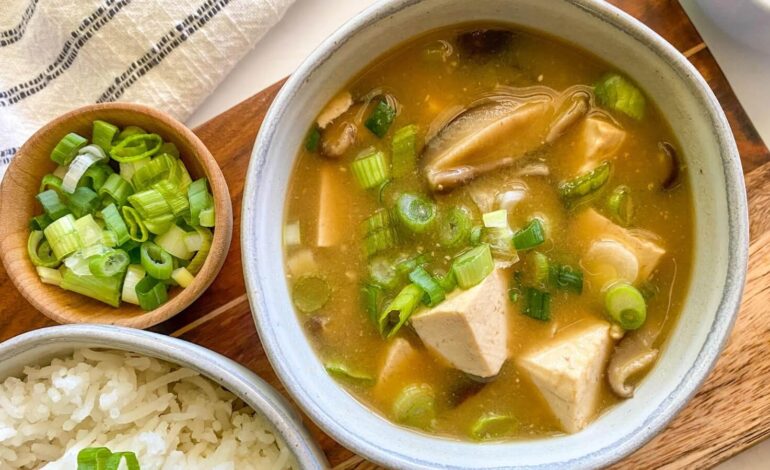
The Ultimate Guide to Miso Soup Calories, Is Miso Soup Gluten-Free?
In our quest for health-conscious dining, we often find ourselves exploring diverse culinary options, and one of the fascinating choices that have captured the attention of food enthusiasts and health-conscious individuals alike is miso soup. This Japanese staple has gained international recognition not only for its delicious umami flavor but also for its potential health benefits. In this comprehensive guide, we will delve deep into the world of miso soup, exploring its calorie content, gluten-free nature, and why it deserves a prominent place in your diet.
Unveiling Miso Soup Calories
A Nutritional Profile Worth Noting
Miso soup is not just a flavorful broth; it’s a nutritional powerhouse as well. When we talk about miso soup calories, it’s essential to understand the ingredients that contribute to its nutritional content. The primary components of miso soup include:
- Miso Paste: The star of the show, miso paste, is a fermented soybean paste that provides a rich and savory flavor. In a standard serving of miso soup, which is about one cup, you’ll find approximately 30-40 calories contributed by miso paste.
- Dashi Broth: Dashi, a stock made from seaweed and bonito flakes, forms the base of miso soup. It adds depth and umami to the soup without a significant calorie load. Typically, a cup of dashi broth contains around 5-10 calories.
- Tofu: Tofu is a common addition to miso soup, and it’s both protein-rich and low in calories. In a cup of miso soup, you can expect about 20-30 calories from tofu.
- Vegetables: Vegetables like seaweed, scallions, and sometimes mushrooms enhance the flavor and nutritional value of miso soup. These veggies add minimal calories, usually around 5-10 per cup.
So, if you’re wondering about the total calorie count of a standard serving of miso soup, it typically falls within the range of 60-90 calories. This makes it a fantastic choice for those looking to enjoy a flavorful soup without packing on extra pounds.
Miso Soup in Your Diet
Now that we have a clear picture of the calorie content in miso soup, you might be wondering how to incorporate it into your daily diet. Miso soup’s low-calorie nature makes it an excellent choice for those looking to maintain or lose weight. You can enjoy it as:
- A Light Appetizer: Start your meal with a cup of miso soup to curb your appetite without overindulging in high-calorie appetizers.
- A Wholesome Snack: Need a quick and healthy snack? Miso soup is the answer. It’s low in calories but high in satisfaction.
- A Nutrient-Rich Side: Pair your main course with a serving of miso soup to boost your nutrient intake without adding many calories.
Debunking the Gluten Myth
Is Miso Soup Gluten-Free?
In recent years, gluten-free diets have gained popularity among those with gluten sensitivities or celiac disease. The good news for miso soup lovers is that, in its purest form, miso paste is gluten-free. Miso is traditionally made from soybeans, salt, and koji (a type of fungus), all of which are naturally gluten-free.
However, it’s crucial to be aware of potential sources of gluten contamination in miso soup. Here are a few things to consider:
- Additives: Some commercial miso paste varieties may contain additives or flavorings that introduce gluten. Always check the label to ensure you’re getting a gluten-free product.
- Cross-Contamination: If miso soup is prepared in a kitchen that also handles gluten-containing ingredients, there’s a risk of cross-contamination. If you have a severe gluten allergy or sensitivity, be sure to inquire about kitchen practices when dining out.
- Wheat-Based Ingredients: While traditional miso paste is gluten-free, some modern variations may include wheat in the ingredients. Again, checking the label is essential.
In summary, pure miso paste, which is the heart of miso soup, is gluten-free. However, it’s essential to exercise caution and read labels if you’re following a gluten-free diet due to medical reasons.
Embrace Miso Soup’s Delightful Health Benefits
Beyond the calorie count and gluten considerations, miso soup offers an array of health benefits that make it a remarkable addition to your diet:
Gut-Friendly Probiotics
Miso paste is a fermented food, and as such, it contains beneficial probiotics that support a healthy gut. These probiotics can aid digestion and boost your overall gut health.
Rich in Essential Nutrients
Miso soup provides essential nutrients like vitamins, minerals, and amino acids. It’s particularly rich in vitamin K, which is essential for bone health, and provides a good amount of B vitamins as well.
Potential Cancer-Fighting Properties
Some studies suggest that the isoflavones found in soybeans, a primary ingredient in miso paste, may have cancer-fighting properties. While more research is needed, it’s an encouraging sign of the potential health benefits of miso soup.
In Conclusion
Miso soup is a delightful culinary creation that offers a harmonious blend of flavor and nutrition. With its relatively low calorie count and potential gluten-free status, it can be a fantastic addition to a balanced diet. Whether you savor it as a comforting appetizer or a light snack, miso soup has earned its place in the world of healthy and flavorful eating.
So, the next time you’re considering a warm and soothing bowl of soup, look no further than miso soup. Its delicious taste and potential health benefits make it a choice that not only satisfies your taste buds but also nourishes your body.







2 Comments
[…] do you make a quenelle? All you need is your quenelle spoon and a bowl of soft food. Slide the spoon into the food, then rub it against the side of the bowl to create a beautiful, […]
[…] the nutritional value and freshness of fruits and vegetables. Her work cleared the way for advances in food preservation that now benefit global customers, the food industry, and […]
Comments are closed.